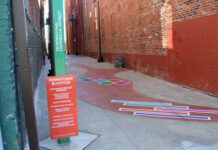By JONATHAN SYNDER
In a public meeting at the Wells County Public Library, the Regional Sewer District fielded questions and gave an update on the timeline for the Tocsin project.
In the public meeting portion of the RSD proceedings, Ryan LeFeld of Choice One Engineering presented the Tocsin Project area, located north of the intersection of State Route 224 and State Road North 600 East in Tocsin.
LeFeld gave a presentation on what will happen with Tocsin, the timeline for the projects completion, the project cost for the RSD and what payment for the property owners will look like. LeFeld stated that the project is estimated between $4,500,000 and $5,000,000. LeFeld also noted that if things go smoothly then construction could start next spring at the earliest, and next summer at the latest.
RSD Attorney Mark Burry stated that the RSD has submitted an application for grant funding for the project. Originally, the Tocsin project was lumped into the Craigville and Kingsland projects in their grant application, but there were too little funds to justify putting all three areas into one funding cycle. The Tocsin project was delayed twice due to the funding issues.
Burry noted that any additional money not covered by grants will be taken out as a low interest loan from the State Revolving Fund. The RSD can finance that expense out over 30 years to help pay that loan back. Burry calculated that each property owner would be paying a $93.30 charge per month at minimum to pay the loan back.
Burry also stated that once funding is available for the project, notices will be sent out to property owners that they should connect to the system. Statutes state that any sewage discharging structure within 300 feet of a RSD line must be connected. There are exemptions for people on septic systems, but the systems must be less than 20 years old and inspected by the Health Department.
Tocsin homeowners will only be held responsible for maintenance of the sewer line from their house to any installed grinder stations. RSD Superintendent Lewis Brown stated that an easement would be needed so the RSD can access the grinder station for maintenance. Brown acknowledged that in the past people have had concerns over these easements, but assured the public they only need access from the main road to the grinder station.
The majority of public comments and questions centered around the details of grinder installations, any potential relief funding for low income and nonprofit properties, the longevity of the system, potential drainage tile problems and the interim rate fee for people not connected yet.
Brown stated that the contractors use directional boring, a process where a drill is pushed underground and steered to where it needs to go, to install grinders. Brown noted that the contractors who use directional boring will have to mark any gas lines, or other public utilities so they can avoid hitting those.
Brown noted that green RSD flags will be placed in the Tocsin project area once the RSD is ready to start off construction. Brown urged anybody with that RSD flag should call their phone number if they have questions about what’s being done.
Grinders will be placed wherever the property owner wishes, according to Brown and LeFeld, but the cost of connecting electricity to the system and to the main sewer line will be on the homeowner.
RSD board member Leon Berning addressed the potential relief funding, stating that funds are available to cover the connection cost, not to ease the monthly bill. Berning stated that property owners would have to fill out an application, which needs approval in order to get the funds.
When the life cycle of the new sewer system was questioned, Brown said that documents force the RSD to maintain that system for its life cycle, which is estimated at 35 years. Burry also noted that costs could theoretically lower when the loan is paid off, but maintenance bills and inflation could keep the rate steady in 30 years time.
Brown also addressed the need for the interim rate for customers, comparing it to an up-front fee for a contractor. Brown also noted that SRF requires that all the billing must be in order if they want to secure the low interest rates on their loans. Brown also warned that contractor’s could accidentally damage any drainage tile property owners have. Brown stated that if they can prove the contractor damaged the tile it would be the contractor’s responsibility, but warned that proving fault can be extremely difficult.
In the business portion of the meeting, held before public comments, which saw the RSD pay SRF Disbursement requests to Wessler Engineering, Miller Burry and Brown, and Choice One Engineering. $15,297.60 went to Wessler, $28,650 to MBB and $1,653 to Choice One.
Brown noted that everyone in Kingsland has recieved a notice to connect. Two connections were added since the RSD’s last meeting, with contractors hired for the others. Brown also announced that three connections will be paid for by the RSD due to those property owners granting them easement access to the main sewer line to build lift stations.
LeFeld stated that the only thing left for the Kingsland project is to restore the land and finish the punch list items. Brown also said that Craigville residents are still making connections in their project area. Brown commented that the new license plates for the RSD’s new truck have come in and are on the truck.
Two resolutions were also passed by the RSD, which put into writing that the preliminary engineering report was presented to the public and that the funding application was sent to the state.
The RSD also renewed their insurance policy. Tom Neuenchwander of Amstutz Insurance presented a policy that did not see any significant changes, according to Berning. The bills for the RSD this month totaled $13,013.14.
jonathan@news-banner.com



